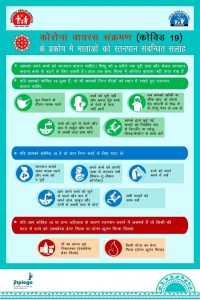While the world’s resources and energy get diverted to combat the COVID-19 pandemic, failure to attend to essential maternal and newborn health services might cost more dearly than the pandemic itself.
Jodhpur, Rajasthan
Childbirth cannot wait for the pandemic curve to flatten, or for the lockdown to end and life to trickle back to normalcy. Every birth of a newborn needs a level of preparation, and for a mother who could be suffering from COVID-19 or suspected of it, the health workers need to know what to do and how to act, not just to save the mom and baby, but also to protect all else at the health care facility from this highly contagious virus.

Dr. Suman Vishwakarma, ob-gyn in the final year of her residency at Jodhpur Medical College, a tertiary health facility that conducts around 1,200 to 1,500 deliveries a month, knew she needed to be well prepared for such clients at her facility. A former captain in the Indian Army, having served the country for seven years, Dr. Vishwakarma was trying to gain an understanding by reading advisories and talking to her colleagues at other facilities. So, when Jhpiego reached out to her for an online COVID-19 training, she enthusiastically agreed and joined the training using her phone, while at the facility. With support from the Children’s Investment Fund Foundation, and in partnership with the Government of Rajasthan, this training was conducted by Jhpiego under the Dakshata program. Dakshata, meaning adroitness, is Government of India’s strategic initiative aimed at strengthening the quality of care during and immediately after childbirth through competent, skilled and confident providers and Jhpiego has been the lead technical partner in its development.
Almost immediately after this training, Dr. Vishwakarma got the opportunity to put her new learnings to practice, when she received a pregnant woman in active labor, who had been in quarantine due to her travel to a corona outbreak zone and had not completed her mandatory 14-day isolation period. She had not yet been tested for COVID-19 as she was asymptomatic. The doctor recalled the infection prevention measures, triaging and case management protocols to be applied during COVID-19 that were discussed during the training. As the hospital did not have a separate delivery set-up for COVID-19 suspected patients, Dr. Vishwakarma had to conduct the delivery in the normal labor room, but did so with all the precautions she had been taught. “I restricted all non-essential movement in the ward. Before transferring the patient to the labor room, I asked my staff to remove all equipment that was not required at that moment, from the labor room. Once the labor room was ready and all three of us, the nurse and assistant housekeeper and I, were wearing our personal protection equipment (PPE), we shifted our client to the labor room,” quipped the doctor.
The labor progressed well and soon, the mother gave birth to a healthy baby boy. While under normal circumstances, the doctor would have instinctively put the baby on the mother for skin-to-skin contact after birth, in this particular case Dr. Vishwakarma paused to think of what to do next, as the safety of the vulnerable newborn was paramount in her mind. Again, she leaned back on the Jhpiego training she had received recently. “I handed the newborn to the mother, but only after teaching the new mom to take precautions like wearing a mask, practicing hand hygiene, and encouraged her to exclusively breastfeed her baby,” she said.

Dr. Vishwakarma knew there was more to be done. She got the mother tested for COVID-19. She had the mom and baby shifted into an isolation room, advising the mother to continue breastfeeding, while paying particular attention to hand hygiene, and to not kiss the baby on his mouth or nose till the test results came in. The doctor knew that the labor room as well as the waiting room, where she had received the mother, needed to be properly sanitized, and her team performed the same keeping in mind the disinfection of care area guidelines using hypochlorite solution that they had learned through the Jhpiego training. To everyone’s relief, the mother tested negative.
Before discharging the mom and her baby, like always, the staff at the facility also ensured that the immunization of the newborn began, and the mother was counseled about the child’s immunization schedule, newborn care, exclusive breastfeeding and also family planning. Handling this case gave the doctor and her team the confidence that they were well prepared to handle childbirth and provide quality care to mothers and their newborns even amidst the pandemic. Dr. Vishwakarma thanks Jhpiego for this and says, “Overall, I want to say that through each and every training, small learnings’, minute things contribute to our knowledge and once it comes to implementation – everything works collectively in our mind and helps us in decision making. I feel that the Jhpiego (training) helped me in managing this case very well. I want everyone to get this training, because when it comes to implementation, we can only implement what we know.”




